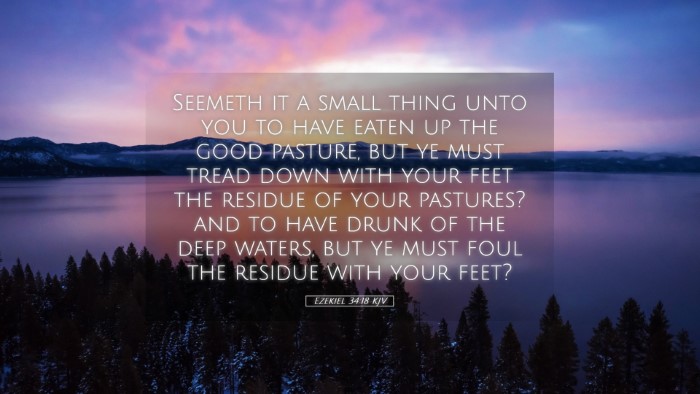Bible Commentary on Ezekiel 34:18
Ezekiel 34:18 states: "Is it a small thing unto you to have eaten up the good pasture, but ye must tread down with your feet the residue of your pastures? and to have drunk of the deep waters, but ye must foul the residue with your feet?" This verse addresses the negligence and abuse of leadership in Israel, particularly focusing on the spiritual shepherds of the people.
Contextual Analysis
The chapter opens with God addressing the shepherds of Israel, who have failed to care for God’s flock. This prophecy is significant as it establishes the theme of divine judgment against irresponsible leaders who prioritize their own needs over those they are supposed to tend. Within the broader context of Ezekiel, this passage serves not just as a critique of human leaders but also as a foreshadowing of the coming ideal shepherd, which is often interpreted as the Messiah.
The Failures of the Shepherds
Matthew Henry comments extensively on the neglect exhibited by the leaders: "These shepherds have not only failed to feed the flock but have also consumed what should have been theirs to tend, leaving the remainder defiled." This negligence leads to a corrupted environment where the residue of good resources is wasted or polluted.
Albert Barnes deepens this analysis by suggesting that the imagery of pasture and water symbolizes not just physical sustenance, but spiritual nourishment. The 'good pasture' embodies the teachings and guidance which should be provided to the faithful, while 'fouling the residue' indicates the mismanagement of these resources that leads to spiritual desolation.
Theological Implications
Theologically, this verse brings to light the responsibility of leaders in upholding purity and providing spiritual sustenance to their followers. Clarke points out that divine judgment is a recurring response to the dereliction of duty among leaders: "Such is God's manner of dealing with the unfaithful, lifting the burden of blemished leadership upon their heads."
This concept reverberates throughout Scripture, underscoring a critical principle for pastors and spiritual leaders today: they are to serve as shepherds who nurture, protect, and guide their flocks with integrity.
Practical Applications
For modern-day leaders, there are tangible lessons to be drawn from this admonition. First, it is vital that those in leadership roles actively seek to provide for their congregations’ spiritual needs. Investments in teaching, counseling, and community engagement are necessary to prevent the ‘fouling’ of resources meant for nourishment.
- Feed the Flock: Leaders must prioritize the spiritual education of their members by preaching unadulterated truth from the Scriptures.
- Model Integrity: Spiritual leaders should exemplify a life reflective of the character of Christ, who served selflessly.
- Protect the Resources: Care must be taken not to abuse leadership power, ensuring that spiritual "pastures" are healthy and nurturing.
Conclusion
Ezekiel 34:18 serves as a potent reminder to all spiritual leaders of the weighty responsibility they carry. As discussed in various public domain commentaries, the true essence of shepherding is not self-service, but sacrificial love and diligent care for the well-being of those entrusted to them. Integrating these insights can help cultivate a more robust and spiritually fulfilling community within the church, enabling leaders to reflect the heart of the Good Shepherd — Jesus Christ.


